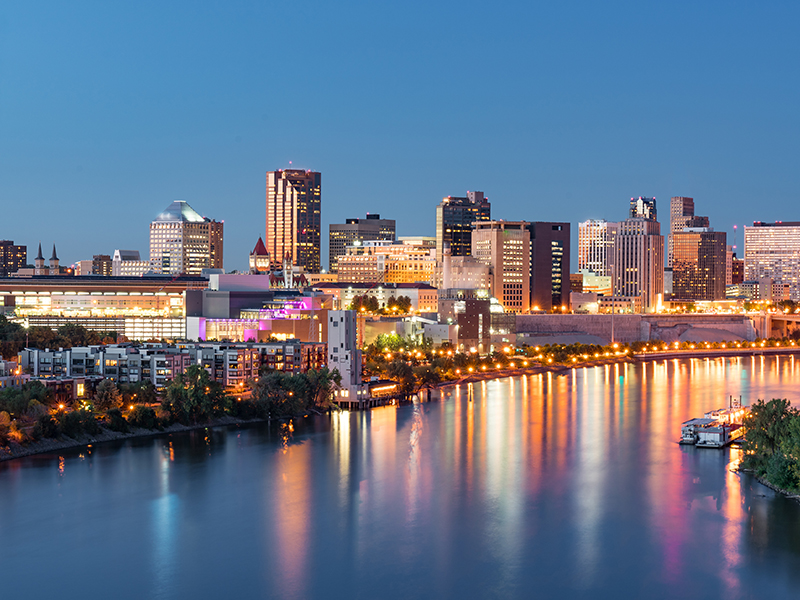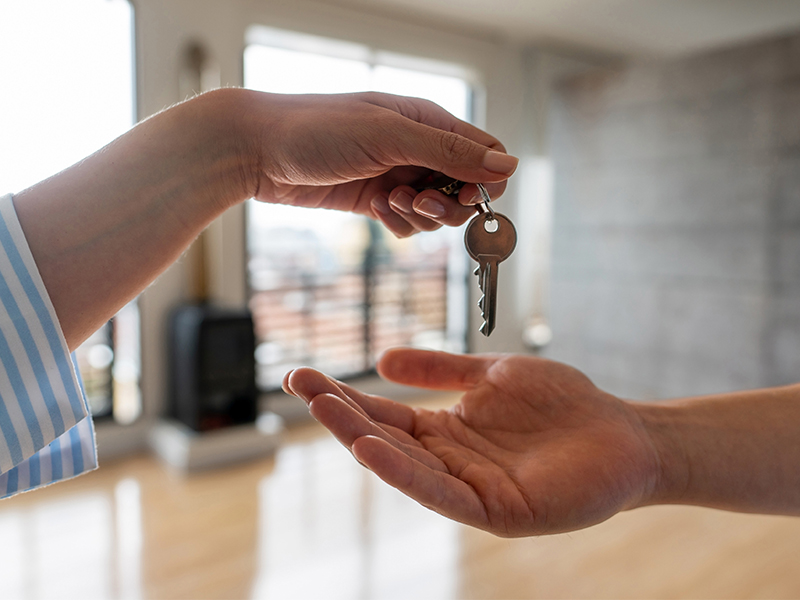In the city of St. Paul, Minnesota, almost half of the households are renter occupied. There is a huge demand for rental homes and that means that owning a house for rent in St. Paul can generate strong and consistent income for investors. Here, we’ll take you through the reasons and considerations you need to keep in mind if you’re thinking of investing in property in St. Paul with a view to renting out.

Table of Contents
Benefits of buying to rent
First, let’s take you through the most common benefits of investing in a rental property.
Paying your mortgage and making a profit
The most important reason to rent out is simple and clear enough, to make money from a residential property that you are not occupying. But how do you know how much you should charge per month? To a large extent, this will be dictated by the location you are in and the type of housing you are renting out. You are, of course, free to charge whatever you want, possibly believing that the features or location of the property merit premium rates. However, often it is the case that the market will determine how much you charge. Your real estate agent will be the best guide as to what your property can fetch.
Regardless of whether you need the income in order to pay the mortgage or if you’re in a position to just reap the monthly rent, everyone is looking to maximize their returns. If you need to ensure monthly payments, then you’ll almost certainly want to price very competitively. Naturally, this will draw interest and also may help secure long-term tenants, who either sign long-term contracts or gladly renew annually. Another strategy is to strongly vet your potential tenants, hopefully, they turn out to be good tenants, and then provide concessions on rates or home improvements when it’s time to renew the contract. This is a prudent approach, as it is often better to have your property occupied than holding out for someone willing to pay high rates.
When it comes to renting out luxury properties, the market will still play a key role in determining what your rates should be. However, since the luxury market will be more particular about certain features and amenities, there will be more room for you to set a price you determine for what your property offers.
If you’re looking to buy a house for rent in St. Paul, Hamline Midway and Union Park are the neighborhoods that have the highest rental prices. In Hamline Midway the average rent price tops $1,700, while the average in Union Park is $1,661. More mid-range rental prices can be had in Macalester-Graveland and Highland with average rent prices of $1,285 and $1,353 respectively. At the lower end of the market, neighborhoods like Greater East Side and Payne-Phalen see median rent prices between $1,000 and $1,150. Again, your real estate professional will be your best guide on where to buy depending on your budget and goals.
Diversifying your investments
Many people would say that one of the worst places to keep your money is in a bank. The interest you receive never really matches inflation, and even the returns on high-paying interest accounts are poor. It is generally a much better idea to make investments. You may have other investments, such as stocks, bonds, or even art, but buying a home to rent provides some of the strongest returns of any investment.
A house can be part of an investment portfolio consisting of different properties. The benefits of having more than one property are fairly straightforward. Should one property remain vacant for a long period of time, the other properties should still be able to carry you. It’s a case of not putting all your eggs in one basket.
Generational Wealth
A startling statistic is that 70% of families considered well-off or wealthy are likely to lose their wealth within 1 generation. This figure rises to 90% by 2 generations. The reasons, of course, depend on the particular circumstances of the particular family.

Though reasons vary, one recurrent reason is that there may be a difference between the financial literacy of those who invest and those who do not. Children who have seen parents invest are more likely to understand the entrepreneurial drive and also the required discipline needed to gain financial success. Even if it is the previous generation that has endeavored to build wealth, the children of these parents see how this wealth was generated and are more likely to seek opportunities for themselves.
As these children become adults they will need capital to seek their own ventures. This could come in form of lending, as their parents did, or it could come directly from their parents.
A property that you rent will eventually come under your full ownership, once you’ve paid the mortgage. This time frame can be 30 years which is the usual term for mortgage repayment. However, refinancing to accelerate the time frame where you pay more monthly or more often in order shorten the time you pay the lender is possible. This means that you could have a fully paid home in as little as 20 or even 15 years. This timing is important because it is around this time that the kids you raised are making their way into the world and having a fully paid asset means that your children can start their adult lives debt free.
A house you buy to rent pays for itself and may even allow you to make some monthly profit. However, a big benefit is that in the long run, you can have a retirement home if you choose to sell your family home and downsize to the property you’ve always rented out. Another option is to sell the rented property after it has grown in equity and put that money towards buying your ideal retirement home. However, maybe the greatest benefit of owning a house to rent is that it will enable you to give the next generation of your family a massive ladder up while ensuring that you are financially secure and able to live as you wish.
The St. Paul real estate market
The St. Paul real estate market is incredibly stable and on the whole, has shown steady appreciation over the last 5 years. In February 2018 the average median sold price of a home in St. Paul was $200,000. By the end of February 2023, that figure was closer to $260,000. That means that in five years your home would have risen in value by 30%.
When looking at the figures, we do have to bear in mind that the last 2 to 3 years have been almost unprecedented in the real estate market. Record high prices were recorded in many areas across the country at the height of the housing frenzy which peaked in the middle of 2022. The high-interest rates brought in by the Federal Bank in mid-2022 was an attempt to prevent an overheating of the market, and it can be argued that it has been successful. High-interest rates have cooled soaring market prices and brought back stability and sustainability.
If you’re looking to invest in houses for rent in St. Paul, you’re in a much better position in 2023 than the previous year. Also, with the return of a more normalized market, you can expect steady growth in appreciation rates.
What makes St. Paul a great place to own a rental
A large pool of renters
St. Paul has a large student population. There is the University of St. Thomas, Hamline University, and Concordia University just to name a few educational institutions in the area. This translates to continuous demand for homes. The savvy investor should be looking to tie up students on long-term contracts, providing they’re good tenants. If you’ve developed a reputation for providing a good home and are mindful of your tenants’ needs, you can, just by word of mouth, have continual occupancy for most if not all of the year.
St. Paul is also growing in terms of its economy and is drawing in many young professionals from around the country. So even if you’re not entirely sold on renting out to students, then there is still a large pool of professionals who will gladly rent your property.
A landlord-friendly local government
Demand for homes is high in St. Paul, so much so that in 2021 the state brought in government ordinance to address the issue of a shortage of affordable rental homes. The Rent Stabilization Ordinance set a limit that rent prices could not be increased by more than 3% within a 1 year period. However, there are multiple exceptions placed within the ordinance that allows for up to an 8% and in some circumstance an unlimited price increase. One exception is if you have just cause to raise the price higher than 3%, and this rule heavily favors landlords.
The other main challenge that landlords face apart from raising rates is evicting tenants. Some areas like New York and California make it very difficult to evict tenants with laws very much protecting the occupier of the property. St. Paul favors the landlord, making it easy and relatively quick for homeowners to evict tenants.
Do you need a property manager?
Having a property manager take care of everything is a great way to enjoy the benefits of owning a house to rent in St. Paul without having to deal with much of the possible headaches. A property manager can market your property, vet potential tenants, and then take care of monthly collection. Being the experts in the area, they’ll be able to accurately price your home giving you the best chance to keep it occupied. They’ll take care of any sudden emergencies in the property, such as the need to carry out repairs, and will have a raft of professionals from, electricians to plumbers ready to respond. Your tenants will always have someone local in the area to address any issues that may arise. All of this adds up and makes the tenant experience better, improving the chances of tenants staying and renewing or giving good references for future tenants.

If you don’t live locally and even if you do, a property manager can make owning an investment property much easier. You’ll pay within the region of 8% to 12% of the monthly income as a monthly fee, but for this, you can pretty much sit back and collect your monthly income stress-free.
A final financial consideration
Not everyone is in a position to be the owner of a rental property. If you are looking to rent out a property and use all of the income to pay the loan, you need to have a considerable amount of buffer money set aside for when the house is vacant. It’s true that there is high demand for rental property in St. Paul and with the right help, your property should always be occupied, but what if you need to do repair work? Along with then getting a new tenant after the repairs, this could mean no income for a month, hopefully, no more. Will you be able to cover a month without rental income? If the answer is you’re not sure, you’re probably not in a position to buy a house to rent in St. Paul. As with buying a house for yourself, it is advisable to have at least 6 months of payment money set aside.
Work with the professionals
If you’re looking to buy a house to rent in St. Paul, BuyRentSell.com should be your starting point in your buying journey. We provide a full service for all your real estate requirements in Minneapolis and St. Paul. We also specialize in rentals so if you’d like to take advantage of your home and put it up for rent, we can help.
Contact us at 612.345.899 or leave us a message here and we’ll get right back to you.
